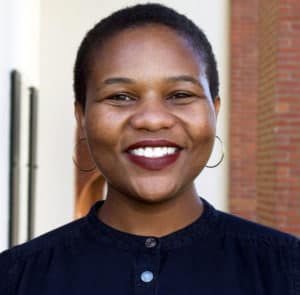Reproductive Justice: A Movement Affirming Women, Families and Communities

By Essence Ellis. This article is reprinted with permission from UCC News.
Almost 50 years after Roe v. Wade, a landmark U.S. Supreme Court decision that ruled that the United States Constitution protects women’s rights to choose an abortion without government intervention, the reproductive justice issue is once again up for debate. In this commentary, Essence Ellis outlines the United Church of Christ General Synod position and invites action.
As with each passing year, our society was shifting and transforming every single day in the year 1994. The very first photo of Pluto was revealed in 1994. Nelson Mandela was inaugurated as President of South Africa in 1994. Edvard Munch’s The Scream was stolen and recovered in 1994. And in June of 1994, during the Illinois Pro-Choice Alliance, a caucus of Black American women came together to share their stories and discuss the state of reproductive health for Black women across the country. It is from their coming together that we have the term “reproductive justice.” Defined by SisterSong as “the human right to maintain personal bodily autonomy, have children, not have children, and parent the children we have in safe and sustainable communities,” the reproductive justice movement invites us all to consider reproduction beyond the individual and legalities.
As we pass the 49th anniversary of Roe v. Wade, we reconsider the lens through which we understand reproductive health. As a movement with a womanist foundation, reproductive justice invites us to consider the whole; to pass the mic to those who are being oppressed by intentional lack of access, to center the narratives of those who have been marginalized, and to understand that this conversation includes, but is not limited to, abortion. It is for this reason, and many more, that we refer specifically to Reproductive Justice as opposed to reproductive health and/or reproductive rights.
We’ve Been Here
Many may be asking themselves why the United Church of Christ should join this conversation. The simple answer is — we’ve been a part of this conversation for decades. Dating back to 1971, two years before Roe v. Wade, our General Synod has passed several resolutions that speak to the issues named by the Reproductive Justice movement. From assisting people in choosing options for unwanted pregnancies to calls for education about human sexuality in churches to acknowledging the divide between poor and wealthy women regarding access — the circle has been drawn wide. Of course, it is not perfect. There is room to grow, nuances to name, and new information to consider with each passing day. But one thing remains the same: individual bodily autonomy must be protected, and we must continue dismantling systems that infringe upon that autonomy.
Many faith traditions believe that we are all moral agents of our bodies. In turn, it is up to us to affirm all women in the decisions they make regarding their bodies and their reproductive health. True to UCC polity, there will be stark disagreements and our theologies may never align. But we must honor our covenant to justice by being committed to continuing the conversation about reproductive justice.
Why Now?
While non-white women and queer folx have been engaging in this conversation for nearly two decades, the recent threats to Roe v. Wade have brought reproductive healthcare back to the national forefront and societal culture. Thankfully, many organizations across the country are working diligently to educate people about reproductive justice, teach us how to support our communities on the reproductive front, and give us the tools we need to organize to take political action.
January 22 marked the 49th anniversary of Roe v. Wade. We invite you to continue to tune in: to participate in future events being held by reproductive justice organizations across the country; to share your own reproductive health stories; to read articles about the movement. We urge you to be present with millions of people around the country as we continue to strive towards reproductive justice. If you aren’t sure where to start, here’s a list of resources.
Resources
Books:
- Killing the Black Body by Dorothy Roberts
- Reproductive Justice: An Introduction by Loretta Ross and Rickie Solinger
- Undivided Rights: Women of Color Organize for Reproductive Justice by Marlene Gerber Fried, Elena R. Gutierrez, Loretta Ross, and Jael Silliman
- Abortion after Roe by Johanna Schoen
Others:
- How Reproductive Justice Is Part of an Anti-Racist Agenda by At Liberty Podcast
- Black Women and the Reproductive Justice Movement with Monica Simpson by Parenting and Politics
- A Step Toward Justice
- Advancing Reproductive Rights, Health, and Justice with Local Resolutions Toolkit
- Queering Reproductive Justice: A Mini Toolkit by the National LGBTQ Task Force
Essence Ellis, a former Council for Health and Human Service Ministries Scholar, is halfway through her year as the first-ever recipient of CHHSM & JLCM United Church of Christ Fellowship.
Join Our Mailing LIst
Follow on Facebook
Iredell Adult Day Services Hosts Ribbon-Cutting to Celebrate Adult Day Health Certification - CHHSM
www.chhsm.org
Iredell Adult Day Services (IADS) in Newton, N.C. — a nonprofit organization dedicated to caring for older adults, vulnerable groups, and their families, and part of EveryAge — hosted a ribbon cut...